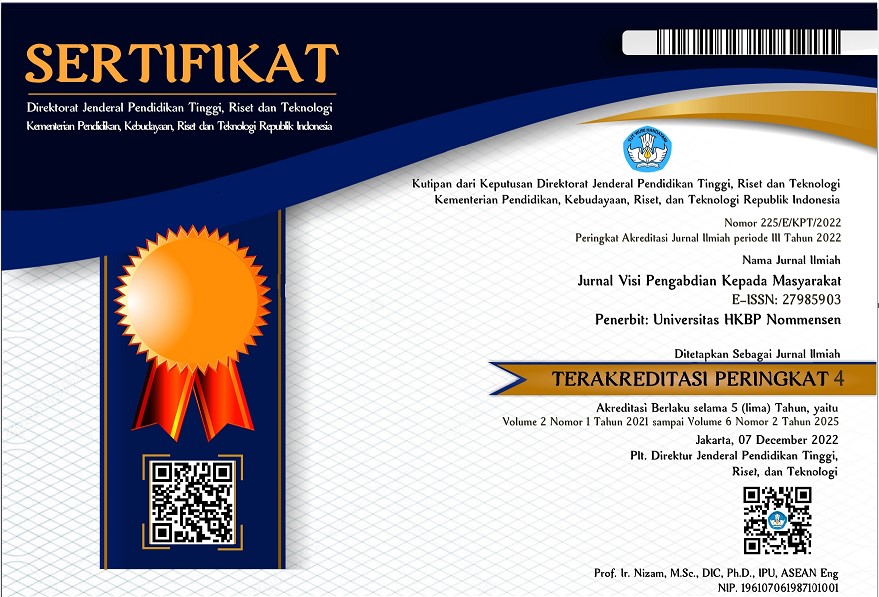Pelatihan Bahasa Inggris “Tenses” Bagi Siswa Sekolah Minggu HKBP Getsemane Medan Labuhan
DOI:
https://doi.org/10.51622/pengabdian.v5i1.2151Keywords:
English, Training, TensesAbstract
Mastery of English is a must for everyone around the world. Likewise in Indonesia, mastering English will provide great benefits for future studies and careers. However, students still experience obstacles in learning and practicing English either in the school environment or in the community because English is a foreign language for the Indonesian people, which is not used as an official or everyday language. Therefore, the PKM activities of the Faculty of Languages and Arts, HKBP Nommensen University try to provide solutions to students and the community to improve their ability to master English. By focusing on English 'tenses' training for Sunday school students at the HKBP Getsemane church, Martubung Medan. The training participants were 20 elementary and middle school students who were Sunday school children and church teenagers. The training lasted for two weeks with three meetings each week, starting from 16-28 October 2023. After the training was carried out, the results of the training in the form of trainee test scores showed significant progress in the trainee's ability to understand and practice English tenses, both written and verbal. From the observations it was also found that the training participants were very enthusiastic and interested in learning English using the methods used in class.
Downloads
References
Babu, R. T., & Kumar, R. D. (2017). Teaching Tenses in a Simplest Method for Non-Native Speakers. IOSR Journal Of Humanities And Social Science (IOSR-JHSS, 22(1), 1–7. https://doi.org/10.9790/0837-221201XXXX
Krisbiantoro, B. (2020). The effectiveness of gamification to enhance students’ mastery on tenses viewed from students’ creativity. Journal of Advanced Multidisciplinary Research, 1(2), 73. https://doi.org/10.30659/jamr.1.2.73-97
Lindström, C. (2017). Two tenses are better than one: Using contrast and complexity to develop grammatical understanding. International Journal for Lesson and Learning Studies, 6(2), 124–134. https://doi.org/10.1108/IJLLS-10-2016-0034
Listia, R., & Febriyanti, E. R. (2020). EFL Learners’ Problems in Using Tenses: An Insight for Grammar Teaching. IJET (Indonesian Journal of English Teaching), 9(1), 86–95. https://doi.org/10.15642/ijet2.2020.9.1.86-95
Mu’man, M., Yana, Y., & Iskandar, Y. (2021). Teacing Tenses in Writing a Scientific Paper Through Peer Teaching Method for Final Year University Students in Covid-19 Era. PROJECT (Professional Journal of English Education), 4(3), 480. https://doi.org/10.22460/project.v4i3.p480-487
Pasaribu, A. N. (2022). EFL Students’ Perception on English Tenses Mastery in Improving English Academic Writing. IDEAS: Journal on English Language …, 10(1), 89–98. https://doi.org/10.24256/ideas.v10i1.2612
Pranoto, Y. H., & Fest Levinli, V. (2023). Two Tenses for All Sixteen Tenses: A Constructivist Approach. Tarling : Journal of Language Education, 7(1), 17–36. https://doi.org/10.24090/tarling.v7i1.9235
Purba, A., Pasaribu, A. N., Elfrida, R., & Pasaribu, T. K. (2023). Errors in Using English Verbs by EFL Students: Tenses and Aspects Analyses. Scope : Journal of English Language Teaching, 7(2), 137. https://doi.org/10.30998/scope.v7i2.16437
Shaukat Ali, Iftikhar Ali, & Saddam Hussain. (2021). Difficulties in the Applications of Tenses Faced by ESL Learners. Research Journal of Social Sciences and Economics Review (RJSSER), 2(1), 428–435. https://doi.org/10.36902/rjsser-vol2-iss1-2021(428-435)
Solihat, A., & Syahrizal, T. (2020). the Implementation of Jigsaw Method in Teaching Simple Present Tense. PROJECT (Professional Journal of English Education), 3(2), 252. https://doi.org/10.22460/project.v3i2.p252-258
Sorohiti, M., & Farrihatul Ahna, M. (2018). The Challenges and Positive Effects in Implementing Strategies in Teaching Tenses. Journal of Foreign Languange Teaching and Learning, 3(1). https://doi.org/10.18196/ftl.3127
Sourav, A. I., Lynn, N. D., & Suyoto, S. (2021). Teaching English tenses in an informal cooperative study group using smart multimedia and gamification. IOP Conference Series: Materials Science and Engineering, 1098(3), 032035. https://doi.org/10.1088/1757-899x/1098/3/032035
Tarmin, A. M., Darwis, N., & Nur, H. (2023). Teacher Reinforcement To the Students To Understand the Six English Tenses. International Journal of Research on English Teaching and Applied Linguistics, 3(2), 59–65. https://doi.org/10.30863/ijretal.v3i2.3905
Tomakin, E. (2014). Teaching English Tenses (grammar) in the Turkish Texts; A Case of Simple Present Tense: Isıl Maketi Iter. International Journal of Learning and Development, 4(1), 115. https://doi.org/10.5296/ijld.v4i1.5154
Published
How to Cite
Issue
Section
Copyright (c) 2024 Arsen Nahum Pasaribu; Rony Arahta Sembiring, Sondang Manik, Tiara K Pasaribu, Leriana Marbun, Melissa Sidauruk

This work is licensed under a Creative Commons Attribution 4.0 International License.












